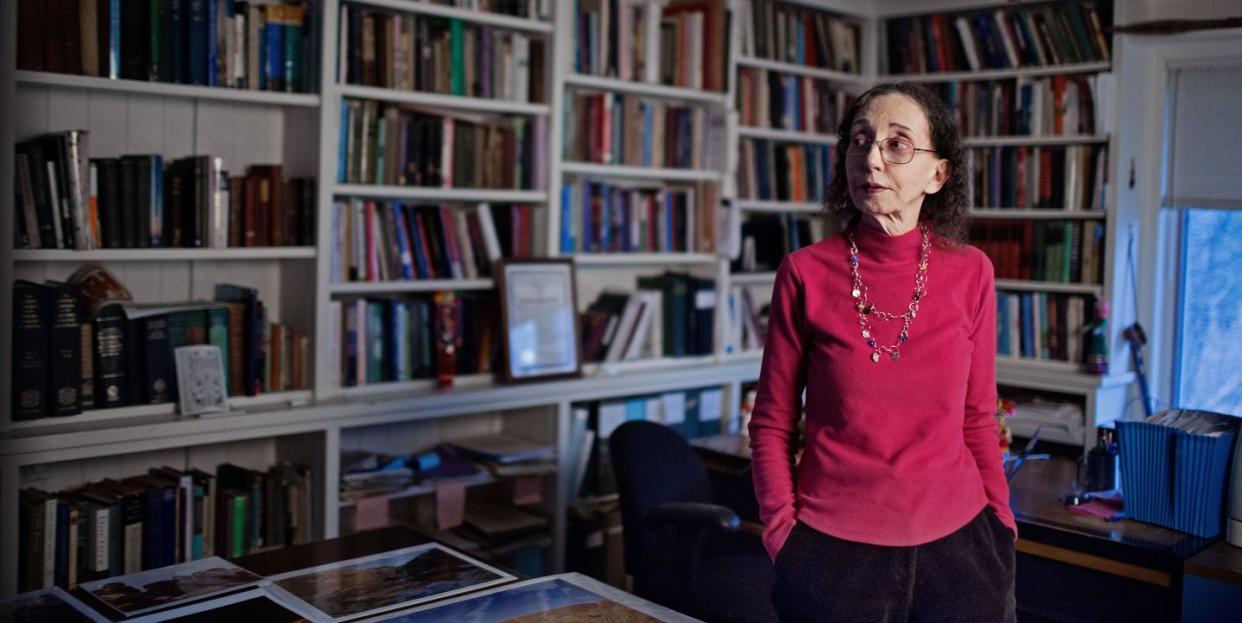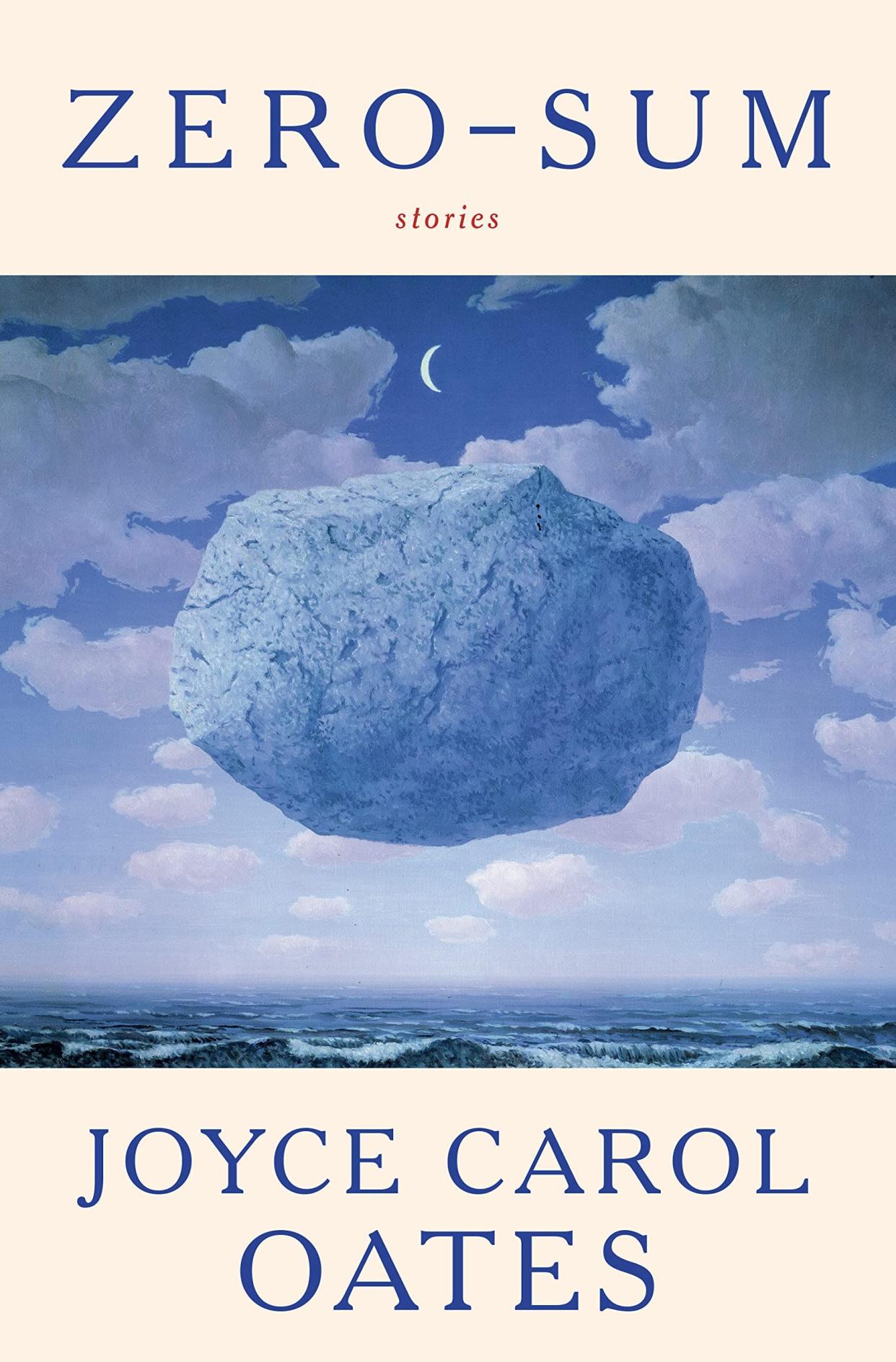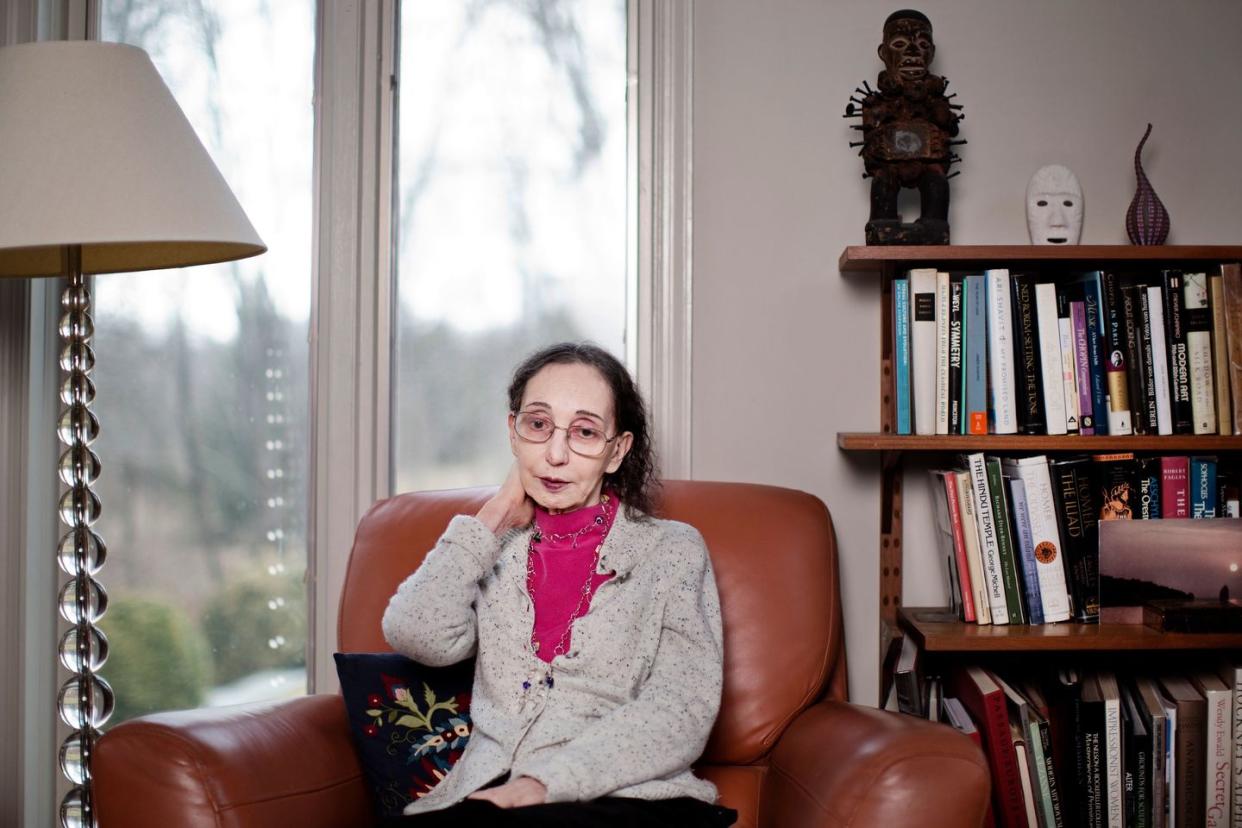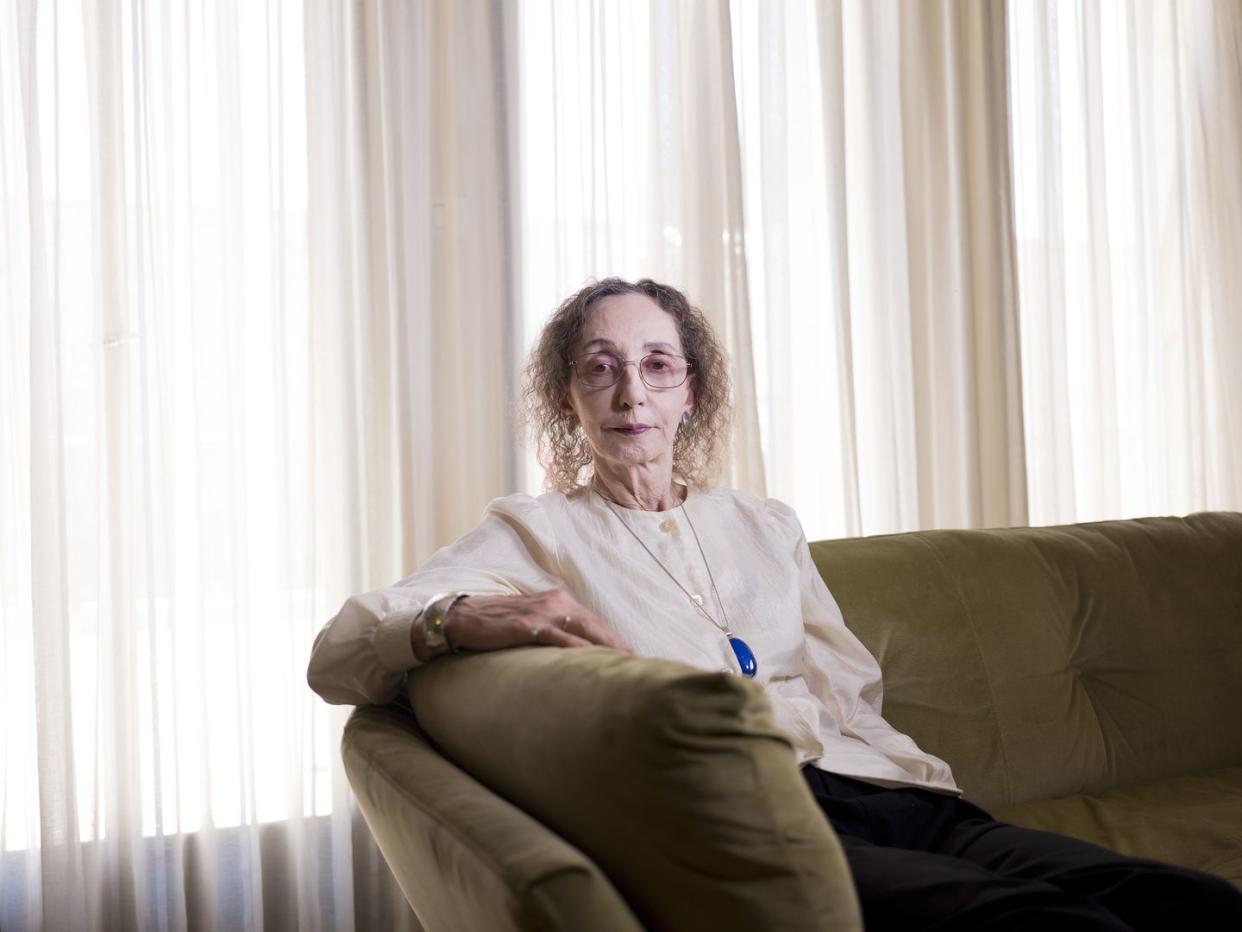At Home With Joyce Carol Oates

"Hearst Magazines and Yahoo may earn commission or revenue on some items through these links."
“Whimsy” is not a word often associated with Joyce Carol Oates, the five-time Pulitzer Prize finalist, social media provocateur, and notoriously prolific chronicler of America’s cracked, calamitous heart. So the vision that greets visitors at the entrance to her light-filled home near Princeton University, where she’s taught for more than four decades—a burbling frog pond, metallic lawn ornaments molded jauntily into oversize roses and a lone, red-combed rooster—conjures a momentary sense of disorientation. Could this dappled suburban idyll possibly contain the formidable figure renowned for more than half a century as our Dark Lady of Letters?
Oates, who appears at the door in light walking shorts and one of those nylon baseball caps that generally come free with a book-fair tote bag, seems likewise unfussily removed from the idea of any high-goth priestess of the arts—gesturing happily to the fruits of her early summer garden and making fond introductions to her two house cats, a majestic but apprehensive Maine Coon and a smoky calico that immediately flops over and shows its belly. She is avid to dissect the recent series finale of Succession (“I think I liked the penultimate episode best, the finale itself was more familiar stuff where they were just conniving”) and breezily dismisses a recent bout with COVID (“The strain I got was evidently very weak, it was really just a cold.”)
But small clues of her life and legacy—some 60-plus novels, along with a vast inventory of essays, short stories, plays, and poetry — soon begin to surface. On her mouth is a pleasingly vampish slash of lipstick the color of crushed blackberries; in a guest bathroom, a vibrant portrait of Marilyn Monroe, inscribed to her from a novelist friend on the occasion of her fever-dream 2000 opus, Blonde, nestles next to a small, moody De Kooning sketch. And her conversation comes dotted with offhand allusions to erstwhile friends and colleagues—Philip Roth, Toni Morrison, Martin Amis, Saul Bellow—that she occasionally refers to on a first-name basis, as if they were not in fact towering icons of 20th-century culture.
Oates, who recently celebrated her 85th birthday, is of course very much one of them, among the last of a set of literary lions that lately seem (see Amis and Cormac McCarthy) to be leaving the planet with astonishing speed. Book-club cubs may come and go, in whatever splashy flavor-of-the-season form the current industry model allows, but big cats like Oates feel increasingly, distressingly rare: envoys from a vanishing world that once placed Great Authors at the center of a zeitgeist now endlessly splintered and atomized.
Unlike so many of them, the Lockport, New York native remains famously, almost ferociously active—still regularly teaching at several universities and producing reams of new material across multiple forms. In addition to fiction, she continues to be a concise and sometimes devastating book critic, a keen Substacker, and a bit of a lunatic on Twitter. This month, she is set to follow last year’s Babysitter, a novel haunted by a spate of real-life child murders in circa-1977 Detroit, with the taut, nervy, and often fantastically unsettling story collection Zero Sum. And once she warms to the topics at hand—including but not limited to her exhaustively noted productivity and penchant for online rabble-rousing—Oates is unfailingly thoughtful, engaged, and occasionally ruthless in her assessment of a poorly phrased question or a mediocre piece of writing.

$29.00
amazon.com
Even “The Suicide,” a striking stream-of-consciousness piece midway through Zero that traces the conflicted inner monologue of a bipolar novelist who was once a celebrated wunderkind of modern lit, comes at its subject with a refreshing lack of reverence. Yes, Oates says, it was inspired by the late David Foster Wallace; no, she was not particularly a fan. “I didn’t know him at all, and the only story of his that I really like and teach is not at all like anything else he wrote, it’s only about two pages long,” she admits easily. “I'm just fascinated by other writers, by the voices that they construct and how they become, in some cases, trapped within them… But also I'm very sympathetic with that point of view—the suicide who can't bring himself to commit suicide because he hasn't written the perfect note. Because really, you wouldn't want to leave an inept suicide note, and you wouldn't want to not leave a note if you're a writer, you know?”
Elsewhere in the collection, Oates slips into the skins of both a high-strung graduate student slowly unraveling at an off-campus barbecue (in the title story’s fraught opening salvo) and a feral pack of teenage girls enacting their #MeToo revenge on a series of local grandees (“Mr. Stickum”). There are quiet, evocative little snippets of O. Henry heartache (“Sparrow,” “Take Me I Am Free”); more than one blithely absurd future dystopia (“MARTHE,” “This Is Not a Drill”); and an enjoyably bonkers slice of pure body horror (“Monstersister”) that nearly begs to be turned into a James Wan film. Not much connects them all, perhaps, beyond a certain stylistic élan, and Oates’ enduring predilection for pressing down on the tender squash-blossom bruises of the human condition.
“She is a novelist in the grand Victorian manner,” says Margaret Atwood, her similarly generative friend and comrade-in-arms of some 50 years. “If you think of Victor Hugo, Dickens, Tolstoy, Thackery—not the style or the subject matter, but the mission to show society in all its layers and permutations and combinations. They weren’t chiseling miniature portraits, they were doing scope. Some of her diversions are little adventures in the gothic, etcetera, but her main thing I think is the grand-picture novel.”

The author and screenwriter Gillian Flynn, whose own work has carved out an indelible space for flawed, “problematic” female protagonists in pop-cultural lightning rods like Gone Girl and Sharp Objects, casts Oates in yet another light. Reading her seminal 1966 story “Where Are You Going, Where Have You Been” as an undergraduate in the mid-‘90s was, Flynn recalls, “the strangest, most physical sensation, especially going through the [literary] age where every woman had to be drinking a Cosmo and looking for a boy and tripping over her shoes in New York City. I would turn to her because I was like, ‘I can’t take it anymore, I don’t want to read about one more woman who’s clumsy in an adorable way.’ J.C.O. doesn’t mind breaking the taboo of anything, and it doesn’t feel like a deliberate enticement. She’s just brave, and I get the impression that she does not give a shit what people think about her, whether it’s writing a book called Rape: A Love Story or these little encounters on Twitter. People don’t know what to do with that honesty, I think.”
Indeed, Oates seems to spare very few fucks for those who might wish to see her pilloried in the court of public (or at least parasocial) opinion. She tweets about anything and everything—Sharia Law, her dislike of the latest Spielberg movie, cute cat videos—with an abandon that borders on libertine. (“Joyce [posts] what I might put in my diary: ‘A funny thing happened to my feet,’” Atwood suggests wryly, most likely referring to a spectacularly gruesome image Oates once uploaded of a hiking-boot mishap. “It’s more like her thinking out loud a lot of the time.”)
“Twitter is really completely what you make of it,” Oates maintains, with the bemused patience of someone clearly long used to this line of inquiry. “I follow about 30 people, like Rachel Maddow and some poets, this little swath of intellectual people. I usually start my workday around 7:00 AM, and whereas in the old days, maybe I would have a telephone call with a friend, we don't really call our friends anymore. So I usually read almost every article in The Guardian, and then I'll do a tweet, and then I'll go back to my work and then hours later I'll go again. But if you only spend about eight minutes a day on Twitter altogether, it can seem as if you're there all the time.”
She continues, “I get all kinds of responses, let's say 50,000 responses over years. I probably answer 0.001 percent, and I don't even read a lot of that. I think if the positive things said about us on Twitter could make us happy, that would be great, you know? But they don't really necessarily have any effect either. When I said something about gun control, there was a lot of intemperate response, but it wasn't that they were going to come after me,” she breaks off with a laugh. “It’s like, I'm not that important.”
She is of course downplaying both the impact and the occasional outrageousness of certain spicier hot takes (Mississippians don’t read! Is ISIS really all bad?), though not the essential good faith in which her arguments are generally made. And her invocation of the rage that drives so much interaction online—“which is actually inborn, but it gets stoked and amplified by this B.F. Skinner kind of behaviorism, conditioning people to hate and fear anyone who doesn’t look like them"—speaks to the general hardening of hearts and minds she’s looking to upend. If we’re all cordoned off in our information silos, retreating from inconvenient truths into a sort of willfully selective cultural deafness, why not confront that with the digital air horn supplied to her by fame?
Oates’ Zen serenity on the subject may also spring from a long life lived, until relatively recently and quite contentedly, in analog. Born in Niagara County, New York in 1938 to a father who worked in the tool-and-die industry and a Hungarian-American housewife mother, she became an early, insatiable reader. Exposure to Lewis Carroll, the Brönte sisters, and William Faulkner sparked her adolescent imagination; so did the many hours she spent traveling back and forth to school from her family’s farm outside of town: “I just remember walking a lot, I mean miles a day. I even had lunch alone. So each day I would walk this long distance, and I became aware of being a person alone. A lot of what I did from the retrospect of 2023—what any of us did as children—seems very unsupervised. And it must have been a little weird even then, this girl having lunch by herself in a restaurant. But I think it really developed my personality as it is now.”
To this day, she remains an avid walker and runner, with or without company. (Greil Marcus, the venerable music critic, has become one regular companion on her excursions in the California hills—“every morning and quite briskly”—since she began teaching a spring semester course at UC Berkeley in 2016). It’s in this liminal space that she often finds her way into her stories, untangling narrative knots on foot before pouring them onto the page. Consistently, though, the pen proves mightier than the keyboard: “I noticed that whenever I write in longhand and set a scene up, it's so much better,” she contends. “The more handwriting I do, the easier it is to write on the computer, it's just a fact. It’s much more fluid and loose and experimental, and it's a different consciousness. It's as if you were a watercolorist or an oil painter—if you're using watercolors, you have to get it perfect right away. I can’t do that. Most people can't do that! But they can do the kind of oils where they're fussing around for weeks or months. Even now, some of my students prefer to do it that way too.”
If it seems unusual that Oates retains such a substantial course load even now—has she not earned the right, in her ninth decade, to a little leisure time?—she insists she still finds fresh dividends in something that feels “more social and completely not my work. My classes are very spontaneous, so to me they’re like adventures.” That’s how the bestselling novelist Mohsin Hamid (The Reluctant Fundamentalist, Exit West) remembers her several decades ago at Princeton, when he was plunged as an overwhelmed freshman from Pakistan into a world where Cornel West taught philosophy and Oates and Toni Morrison helmed introductory writing seminars. “She was somebody who seemed to emerge from a kind of Harry Potter casting of great literature,” he says via Zoom from Lahore. “An incredibly striking personage, very thin. She has a sort of unusual way of speaking, an unusual demeanor. But she is such a generous interlocutor. The day that I walked into her class, she was treating us like colleagues. And she writes like she needs to—that protean need to write in order to live one's life. She is the greatest exemplar of that I've ever seen.”

Oates herself seems congenitally unmoved by idolatry, or any misty magic-eight-ball readings of what’s to come. “I don’t really think about it,” she says dismissively, of how she’ll be recorded by history. “Are people even going to be reading? Who knows.” And trying to predict the future is, she insists, “almost completely pointless, I’ve found. Now they're talking about AI or ChatGPT or whatever it is. Well, we’ll see, but we don’t really know. People didn’t know the Berlin Wall was going to fall! All those think tanks about politics and German history, they didn’t predict that. And nobody predicted Covid.”
She’s sanguine, too, about last year’s mixed reception to the long-gestating film version of her surrealist Marilyn Monroe meta-fiction Blonde—which earned an Oscar nod for its luminous star Ana de Armas, but whose febrile, pinned-butterfly artiness was met with largely punishing reviews. “Oh, I have a lot of options on my work, all writers do, and almost none of them are ever made,” she shrugs. “I think it's like one in 5,000. So I was surprised that it was ever made at all. When I first saw [director] Andrew Dominik's adaptation maybe 22 years ago, I read through it quickly and I thought it was excellent. And then I heard that he had cast Naomi Watts, but as time went on, he didn't get the money, so she aged out, then somebody else came in and she aged out. I do think Ana de Armas is remarkable.”
An enthusiastic cinephile who used the pandemic to work her way through a canon of TCM-era classics—“screwball comedies, famous American westerns, John Wayne and Tony Curtis, all sorts of movies that are well known but one doesn’t really seem to see, like Born Yesterday”—Oates has ready opinions about contemporary filmmakers too, from Midsommar mastermind Ari Aster, whose early shorts she’s enjoyed on YouTube (one struggles to imagine Bellow or McCarthy spelunking across the internet for avant-garde horror auteurs) to the aforementioned disappointing Spielberg (she found The Fabelmans “incredibly banal”).
Spending several hours in Oates’ presence can feel dangerous in the sense that she so readily tips sacred cows, seemingly without fear or apology. What will she make then of lowlier mammals, like magazine journalists? She’s done too much press, over too many decades, to have much tolerance for certain well-trod subjects, like character motivation or what draws her repeatedly to the murkier shoals of human behavior. But she is also a fun, freaky conversationalist, endlessly curious about the lives of others. When she asks a question, which she often does, she appears genuinely invested in the answer.
And when she speaks of her late husband, the pioneering neuroscientist and former fellow Princeton professor Charles Gross, it’s with obvious affection and pride. (They were wed for a decade until his death in 2019; that marriage followed a nearly-50-year union with her Ontario Review cofounder Raymond J. Smith, whose own painful passing she memorably marked in the raw, intimate 2008 memoir A Widow’s Story.) At one point, Oates offers a mini tour of the photos in her home of Gross—a kind-looking man with an impish smile and a snowy Father-Christmas beard—posing merrily in various far-flung locales.
One gets the sense that she still misses him very much, and the fullness of the life reflected in those pictures and mementos. Gross also left behind two grown daughters, but while Oates has written with startling, sometimes uncanny clarity about childbirth, postpartum depression, and other vagaries of motherhood, she retains no regrets about foregoing that experience herself—“Oh no, no, not at all. As soon as a baby comes into the world you realize, ‘Oh my God, I have to really take care of that baby.’ It would be like a flame in a candle—you just can't let it go out. And I'm not sure that everybody can handle that. Marilyn Monroe always had this fantasy that if she had a baby, she would be more normal or something. I think it would have been the other way around. People sometimes have children to sort of rectify the incompleteness of their lives, and I'm sure that's wrong.”
Her next novel in progress, incidentally, is a work called Butcher—a composite of three 19th-century historical figures including J. Marion Sims, a father of modern gynecology who for decades worked out his deranged theories on the bodies of enslaved Black women, indentured servants, and poor Irish girls. “If you’re a feminist at all or care about women, what I found is so outrageous,” she says, her eyes widening “The people who have read it say it's just so incredibly repulsive, these experiments. And I said, ‘I didn't make these things up, they're actually true!’ I would never have thought of taking the complete teeth out of a person because they were unhappy, or their reproductive organs. The Marquis de Sade was like Mother Teresa compared to these horrible men, but they were revered.”
In the midst of this macabre swerve into medical history, it’s somehow become magic hour in New Jersey, the late-day sun slanting low and golden across the lawn. Oates stands in her driveway, her whippet frame encased in a bulky cardigan against the oncoming chill. Between her recent bout with Covid and several days at a literary festival in Jamaica, she’s been thrown off her usual routine, and it’s clear she’s itching like a racecar to get back to her notepad. (In fact, Atwood recalls, the muse would sometimes strike her friend even on four wheels: “She used to have a little ledge that she would write on as they were driving. That’s writing, and I think she just really likes it.”) Within a few minutes of my departure, Oates will have sent a brief, lovely email, marking the afternoon and making sure an elusive Uber arrived safely. But right now, she waves goodbye and walks eagerly toward the door. The light is fading, and there is work to do.
You Might Also Like
